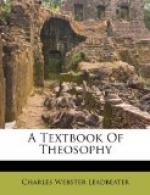Because he recognizes this brotherhood not merely as a hope cherished by despairing men, but as a definite fact following in scientific series from all other facts; because he sees this as an absolute certainty, his attitude towards all those around him changes radically. It becomes a posture ever of helpfulness, ever of the deepest sympathy, for he sees that nothing which clashes with their higher interests can be the right thing for him to do, or can be good for him in any way.
It naturally follows that he becomes filled with the widest possible tolerance and charity. He cannot but be always tolerant, because his philosophy shows him that it matters little what a man believes, so long as he is a good man and true. Charitable also he must be, because his wider knowledge enables him to make allowances for many things which the ordinary man does not understand. The standard of the Theosophist as to right and wrong is always higher than that of the less instructed man, yet he is far gentler than the latter in his feeling towards the sinner, because he comprehends more of human nature. He realizes how the sin appeared to the sinner at the moment of its commission, and so he makes more allowances than is ever made by the man who is ignorant of all this.
He goes further than tolerance, charity, sympathy; he feels positive love towards mankind, and that leads him to adopt a position of watchful helpfulness. He feels that every contact with others is for him an opportunity, and the additional knowledge which his study has brought to him enables him to give advice or help in almost any case which comes before him. Not that he is perpetually thrusting his opinions upon other people. On the contrary, he observes that to do this is one of the commonest mistakes made by the uninstructed. He knows that argument is a foolish waste of energy, and therefore he declines to argue. If anyone desires from him explanation or advice he is more than willing to give it, yet he has no sort of wish to convert anyone else to his own way of thinking.
In every relation of life this idea of helpfulness comes into play, not only with regard to his fellowmen but also in connection with the vast animal kingdom which surrounds him. Units of this kingdom are often brought into close relation with man, and this is for him an opportunity of doing something for them. The Theosophist recognizes that these are also his brothers, even though they may be younger brothers, and that he owes a fraternal duty to them also—so to act and so to think that his relation with them shall be always for their good and never for their harm.
Pre-eminently and above all, this Theosophy is to him a doctrine of common sense. It puts before him, as far as he can at present know them, the facts about God and man and the relations between them; then he proceeds to take these facts into account and to act in relation to them with ordinary reason and common sense. He regulates his life according to the laws of evolution which it has taught him, and this gives him a totally different standpoint, and a touchstone by which to try everything—his own thoughts and feelings, and his own actions first of all, and then those things which come before him in the world outside himself.




